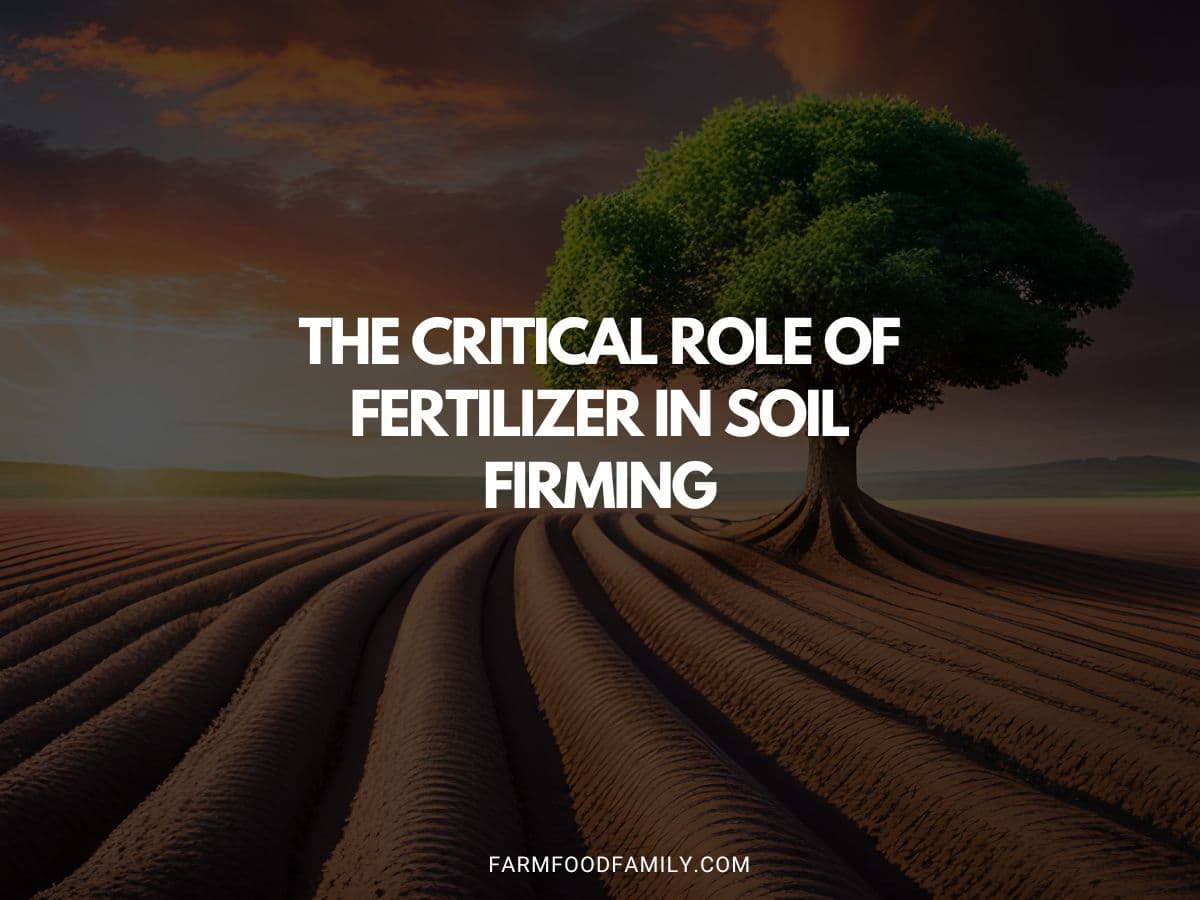The quality of your garden soil doesn’t only determine the health and vitality of your plants. It also plays a significant role in the overall aesthetic and functionality of your garden landscape.
One crucial aspect of soil quality that’s often overlooked is soil structure or firmness. It is the foundation upon which successful gardening thrives, and it’s where the essential role of fertilizers comes into the spotlight.
Understanding Soil Firmness

Soil firmness or compaction refers to the arrangement of soil particles and the pore spaces between them. Ideally, the soil should be firm enough to support plant growth but loose enough to allow water, air, and roots to move freely.
When soil is too loose, it fails to provide sufficient support for plants. On the other hand, overly compact soil can restrict root growth and impede the movement of water and air.
Why Does Soil Firmness Matter?
Soil firmness is critical for several reasons. A well-structured soil will retain enough moisture for plant use but will drain excess water to prevent waterlogging.
It will also enable efficient gas exchange between the soil and the atmosphere, which is crucial for root respiration. Furthermore, it will provide a conducive environment for beneficial soil organisms, which contribute to nutrient cycling and disease suppression.
Fertilizers and Soil Firmness
While organic matter is typically the go-to solution for improving soil structure, fertilizers also play a significant role. Fertilizers contribute essential nutrients that boost plant health, but they can also influence soil firmness. They do this primarily by promoting soil biological activity.
When you apply fertilizers to your soil, you’re not only feeding your plants but also the myriad soil organisms that make up the soil food web.
These organisms – bacteria, fungi, earthworms, and many others – breakdown organic matter and fertilizers into nutrients that plants can use. In the process, they also produce substances that help bind soil particles together into aggregates, thus improving soil firmness.
The Role of Nitrogen
One nutrient that’s particularly important for soil biological activity is nitrogen. Nitrogen is a primary nutrient, meaning it’s one of the nutrients that plants need in the largest amounts. It’s crucial for plant growth and development, as it’s a key component of amino acids, proteins, and chlorophyll.
However, nitrogen is also essential for soil organisms. Many soil microbes, for example, require nitrogen to breakdown organic matter and carry out other metabolic processes. Thus, a nitrogen fertilizer can enhance soil biological activity, which in turn can improve soil firmness. In this context, a nitrogen liquid fertilizer can offer unique benefits.
Nitrogen Liquid Fertilizer: An Excellent Choice
Liquid fertilizers are popular among gardeners for their ease of application and quick absorption. Nitrogen liquid fertilizer, in particular, provides plants with an immediate supply of nitrogen, which can boost plant growth and greenness. Moreover, because it’s in liquid form, it penetrates the soil quickly and reaches the root zone where it’s needed.
As for soil firmness, nitrogen liquid fertilizer can indirectly contribute to this aspect. As mentioned earlier, the nitrogen in the fertilizer fuels the activities of soil organisms. These organisms help form soil aggregates, thereby enhancing soil structure. Furthermore, because the nitrogen is in liquid form, it can distribute more evenly in the soil, providing a uniform supply of nitrogen to soil microbes.
Applying Your Fertilizer
Proper application is key to reaping the benefits of nitrogen liquid fertilizer. It’s important to follow the manufacturer’s instructions regarding dosage and application methods. Over-application can lead to nutrient runoff, which can harm water bodies, and it can also cause excessive leaf growth at the expense of root development.
To improve soil firmness, it’s often best to apply the fertilizer to the soil rather than spraying it on the leaves. You can do this by pouring the fertilizer onto the soil near the base of the plants or by using a drip irrigation system.
Understanding Your Soil Type
Before applying any fertilizer, it’s important to understand your soil type. Different soils have varying capacities for nutrient retention and drainage, which can affect how your fertilizer works. Clay soils, for instance, tend to hold onto nutrients but may drain poorly. Sandy soils, on the other hand, drain well but can leach nutrients quickly. Conducting a soil test can provide valuable information about your soil type and its nutrient content, guiding your fertilization strategy.
Timing and Frequency of Fertilization
When and how often you fertilize can also affect your soil firmness. Generally, it’s best to apply fertilizers when plants are actively growing, as this is when they’ll most readily take up nutrients.
Applying fertilizer when plants are dormant can result in nutrient runoff, as the nutrients are not used and can be washed away by rain or irrigation. The frequency of fertilization depends on the specific needs of your plants and the nutrient content of your soil. Over-fertilization can lead to nutrient imbalances and potential environmental harm, so always fertilize judiciously.
Complementing Fertilizers with Organic Matter
While fertilizers can improve soil firmness by enhancing biological activity, they are most effective when used in conjunction with organic matter. Organic matter, such as compost or well-rotted manure, improves soil structure directly by binding soil particles into aggregates.
It also feeds soil organisms over a longer period, complementing the quick nutrient boost provided by fertilizers. Incorporating organic matter into your soil annually can help maintain good soil firmness and overall soil health.
In conclusion, soil firmness plays an essential role in supporting a healthy, thriving garden. Understanding your soil type, making smart choices about fertilization, and complementing your efforts with organic matter can significantly enhance soil structure.
While fertilizers play a critical role, remember that achieving ideal soil firmness is a holistic process. It requires a comprehensive understanding of your soil, the careful application of inputs, and above all, time and patience. By taking a mindful approach to soil care, you can cultivate a firm foundation for your garden and watch as it blossoms into a vibrant, living testament to your efforts.

